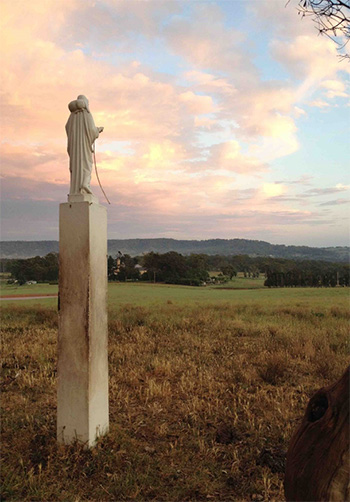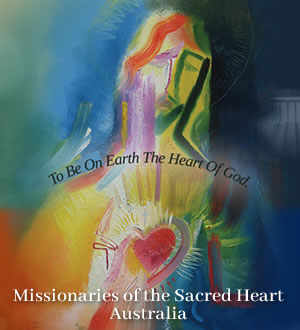 On Sunday 14th June the Church celebrates the Feast of the Most Holy Body and Blood of Christ. It is a providential opportunity for us to reflect on the meaning of this feast for us, at a time when we still cannot welcome the whole local community to celebrate the Eucharist. We miss the deep and richly graced Eucharists that we enjoy here in the Retreat House.
On Sunday 14th June the Church celebrates the Feast of the Most Holy Body and Blood of Christ. It is a providential opportunity for us to reflect on the meaning of this feast for us, at a time when we still cannot welcome the whole local community to celebrate the Eucharist. We miss the deep and richly graced Eucharists that we enjoy here in the Retreat House.
One of the graces of this time could be to remind us of what it is that we most hunger and thirst for. In the First Reading Moses recalls the difficulties they encountered on their journey through the desert to the Promised Land. He recalls particularly how hungry and thirsty they were and how it was God who met their need through the manna and the water that gushed from the rock. What they learned from this is that they could not satisfy their own hunger and thirst. They had to learn to rely, not on themselves, but on God. Moses reminds them that God did more than see to their physical needs. To live we need more than bread and water. We need to experience communion with God. We need to realise that what we hunger for most is ‘every word that comes from the mouth of God’ (Deuteronomy 8:3). Perhaps we have come to realise this more as we have been deprived of the Eucharist. What we thirst for most is to be in communion with God. We need to hear God speaking to us. We need to know that we are loved by God.
Reflecting on this, Saint Augustine came to a deeper understanding of the nature of sin. His early training led him to think of sin as passion overwhelming reason. It is true that acting impulsively from our feelings can lead us to behave badly. Augustine came to see that sin is something more radical than that. It is self-reliance. It is refusal to accept that we are creatures and that everything we are and everything we have is gift. We are on a journey to the Promised Land. We need bread. We need water. And we need to welcome them from God. We sin when we act as though we can determine what is best for us without accepting God’s guidance, without listening to ‘every word that comes from the mouth of God’.
This is what Jesus said so often. We must change and become like little children who know that they are not meant to be self-reliant. They simply and joyfully look to their parents for care and protection. Of course, we are not children, and we have to learn to grow up and to be responsible; but we should never forget that we are dependent upon God and we should learn to delight in this dependence. We can never become mature without it, for human maturity is maturity in love and our deepest love is our communion with God.
The feast of the Most Holy Body and Blood of Christ highlights this dependence. We are hungry and thirsty and we approach the table of the Lord and hold out our hands to receive the life-giving bread and to drink the life-giving wine. God has made us for himself and we are hungry and thirsty to receive the life and the love which he offers us. At the Eucharist we express our need and come to God to receive his most precious gift.
There are two levels at which we are to understand the nature of the gift which we receive in communion. Both are expressed in today’s Second Reading. Paul says: ‘We who are many are one body, for we all partake of the one bread’ (1 Corinthians 10:17). On one level we are expressing our need to belong. We are not meant to be living in isolation. When we share the one bread and when we drink from the one cup we give expression to the communion which we have with each other. When we approach the table at communion, the person offering us communion says: ‘The Body of Christ’ and we reply ‘Amen’. Saint Augustine reminds us that ‘the body of Christ’ is referring to us as a community. So, when we say ‘Amen’, we are committing ourselves to love our brothers and sisters and to live as a member of his body: ‘What you hear’, says Augustine, ‘is “the Body of Christ” and you answer “Amen”. So be a member of the body of Christ in order to make that “Amen” true’ (Sermon 3.7).
This is the more obvious level of meaning, though we might ask ourselves how often we reflect upon it. We are one body because we eat the one bread. It is our communion with Jesus that binds us so closely to one another. As Paul says: ‘The cup of blessing that we bless, is it not a sharing in the blood of Christ? The bread that we break, is it not a sharing in the body of Christ?’ (1 Corinthians 10:16). It is because the risen Jesus is truly present in the community and giving himself to us in communion that we are bound so closely to each other.
Let us look now at the second level of meaning. To someone who did not know, it would appear that we were eating small pieces of bread and sipping wine as a way of giving expression to the truths upon which we are reflecting. But we know that something far more marvellous than that is happening. The prayer of consecration which we pray makes no difference to the physical or chemical structure of the bread and wine. But, something profound is happening. We know by faith that Jesus is truly present and is offering himself to us. He is offering us his ‘flesh’: his weakness, his vulnerability, his acceptance of the human condition with its pains and disappointments, but also with its utter dependence on the Spirit of God. We give our ‘flesh’ to someone when we give ourselves in all that it means to be part of the human condition. It means to give our time, our activity, our energy, our work. It means to give our real self in all its weakness. It means to keep loving people even when it causes us pain. This is what Jesus did and he is sharing his life with us.
Jesus is offering us his ‘flesh’. He is also offering us his ‘blood’. To give our ‘blood’ for someone is to give our life when it is being poured out. It means to give our heart even when it is bleeding. It means to be willing to sacrifice everything for them. It is to give them our life, our spirit, our deepest self. Jesus is giving us the Spirit of love which is his life. Just as God poured water from the rock when Moses struck it, so, when the soldier struck at the heart of Jesus on the cross, there came out water and blood. We celebrate the gift of the water of life in the sacrament of baptism. We celebrate the gift of Jesus’ life-blood when we drink from the chalice at communion. Jesus is offering himself to us.
Jesus insists: ‘My flesh is real food and my blood is real drink. If who eat my flesh and drink my blood you will abide in me, and I in you. Just as the living Father sent me, and I live because of the Father, so whoever eats me [whoever opens his or her heart to me] will live because of me’ (John 6:55-57). ‘The bread that I will give for the life of the world is my flesh’ (John 6:51). Jesus is inviting us to do the same. Whatever others might do to us, let us place our lives in the welcoming hands of God and thank him as we enjoy the blessing of his embrace. When our flesh is broken and our hearts are pierced we can respond by collapsing in on ourselves. We can also do what Jesus did. Jesus is inviting us to ‘believe in him’. He is inviting us to listen to his words, to trust what he is revealing about God and about our real hunger, and to reach out in love to others as Jesus is reaching out in love to us all.
Let us take others to our heart. Let us acknowledge them and how sacred they are, even when they fail to know this or to live up to it. They, like us, are broken in many ways. They are not able to love as they would like. They are hurting and confused, but they have a lot to give. They have all the love in their broken hearts to give. Let us know this and honour it and learn like Jesus to welcome their gift.
At times like this when we cannot freely join others at the Eucharist, Jesus is still welcoming us to come to him and to join him in opening the hearts of others to believe and their arms to love. To eat his flesh and to drink his blood is to receive his offering of himself and to give ourselves to others. Everyone is hungering for ‘eternal life’. We will find it through communion with Jesus, a communion that is offered us every moment of every day. We can live this now, as we look forward to the time when we can give expression to our love by gathering, once again, with our brothers and sisters at the Eucharist.



